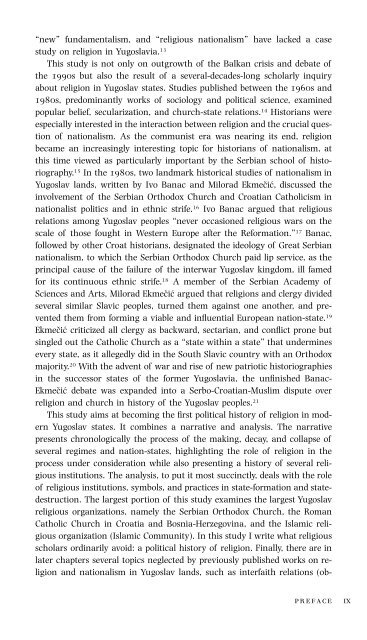Balkan Idols: Religion and Nationalism in Yugoslav States
Balkan Idols: Religion and Nationalism in Yugoslav States
Balkan Idols: Religion and Nationalism in Yugoslav States
Create successful ePaper yourself
Turn your PDF publications into a flip-book with our unique Google optimized e-Paper software.
“new” fundamentalism, <strong>and</strong> “religious nationalism” have lacked a case<br />
study on religion <strong>in</strong> <strong>Yugoslav</strong>ia. 13<br />
This study is not only on outgrowth of the <strong>Balkan</strong> crisis <strong>and</strong> debate of<br />
the 1990s but also the result of a several-decades-long scholarly <strong>in</strong>quiry<br />
about religion <strong>in</strong> <strong>Yugoslav</strong> states. Studies published between the 1960s <strong>and</strong><br />
1980s, predom<strong>in</strong>antly works of sociology <strong>and</strong> political science, exam<strong>in</strong>ed<br />
popular belief, secularization, <strong>and</strong> church-state relations. 14 Historians were<br />
especially <strong>in</strong>terested <strong>in</strong> the <strong>in</strong>teraction between religion <strong>and</strong> the crucial question<br />
of nationalism. As the communist era was near<strong>in</strong>g its end, religion<br />
became an <strong>in</strong>creas<strong>in</strong>gly <strong>in</strong>terest<strong>in</strong>g topic for historians of nationalism, at<br />
this time viewed as particularly important by the Serbian school of historiography.<br />
15 In the 1980s, two l<strong>and</strong>mark historical studies of nationalism <strong>in</strong><br />
<strong>Yugoslav</strong> l<strong>and</strong>s, written by Ivo Banac <strong>and</strong> Milorad Ekmečić, discussed the<br />
<strong>in</strong>volvement of the Serbian Orthodox Church <strong>and</strong> Croatian Catholicism <strong>in</strong><br />
nationalist politics <strong>and</strong> <strong>in</strong> ethnic strife. 16 Ivo Banac argued that religious<br />
relations among <strong>Yugoslav</strong> peoples “never occasioned religious wars on the<br />
scale of those fought <strong>in</strong> Western Europe after the Reformation.” 17 Banac,<br />
followed by other Croat historians, designated the ideology of Great Serbian<br />
nationalism, to which the Serbian Orthodox Church paid lip service, as the<br />
pr<strong>in</strong>cipal cause of the failure of the <strong>in</strong>terwar <strong>Yugoslav</strong> k<strong>in</strong>gdom, ill famed<br />
for its cont<strong>in</strong>uous ethnic strife. 18 A member of the Serbian Academy of<br />
Sciences <strong>and</strong> Arts, Milorad Ekmečić argued that religions <strong>and</strong> clergy divided<br />
several similar Slavic peoples, turned them aga<strong>in</strong>st one another, <strong>and</strong> prevented<br />
them from form<strong>in</strong>g a viable <strong>and</strong> <strong>in</strong>fluential European nation-state. 19<br />
Ekmečić criticized all clergy as backward, sectarian, <strong>and</strong> conflict prone but<br />
s<strong>in</strong>gled out the Catholic Church as a “state with<strong>in</strong> a state” that underm<strong>in</strong>es<br />
every state, as it allegedly did <strong>in</strong> the South Slavic country with an Orthodox<br />
majority. 20 With the advent of war <strong>and</strong> rise of new patriotic historiographies<br />
<strong>in</strong> the successor states of the former <strong>Yugoslav</strong>ia, the unf<strong>in</strong>ished Banac-<br />
Ekmečić debate was exp<strong>and</strong>ed <strong>in</strong>to a Serbo-Croatian-Muslim dispute over<br />
religion <strong>and</strong> church <strong>in</strong> history of the <strong>Yugoslav</strong> peoples. 21<br />
This study aims at becom<strong>in</strong>g the first political history of religion <strong>in</strong> modern<br />
<strong>Yugoslav</strong> states. It comb<strong>in</strong>es a narrative <strong>and</strong> analysis. The narrative<br />
presents chronologically the process of the mak<strong>in</strong>g, decay, <strong>and</strong> collapse of<br />
several regimes <strong>and</strong> nation-states, highlight<strong>in</strong>g the role of religion <strong>in</strong> the<br />
process under consideration while also present<strong>in</strong>g a history of several religious<br />
<strong>in</strong>stitutions. The analysis, to put it most succ<strong>in</strong>ctly, deals with the role<br />
of religious <strong>in</strong>stitutions, symbols, <strong>and</strong> practices <strong>in</strong> state-formation <strong>and</strong> statedestruction.<br />
The largest portion of this study exam<strong>in</strong>es the largest <strong>Yugoslav</strong><br />
religious organizations, namely the Serbian Orthodox Church, the Roman<br />
Catholic Church <strong>in</strong> Croatia <strong>and</strong> Bosnia-Herzegov<strong>in</strong>a, <strong>and</strong> the Islamic religious<br />
organization (Islamic Community). In this study I write what religious<br />
scholars ord<strong>in</strong>arily avoid: a political history of religion. F<strong>in</strong>ally, there are <strong>in</strong><br />
later chapters several topics neglected by previously published works on religion<br />
<strong>and</strong> nationalism <strong>in</strong> <strong>Yugoslav</strong> l<strong>and</strong>s, such as <strong>in</strong>terfaith relations (ob-<br />
preface ix


